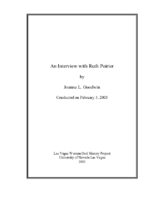Search the Special Collections and Archives Portal
Search Results

Transcript of interview with Ruth Poirier by Joanne Goodwin, February 5, 2003
Date
Archival Collection
Description
In 1927, a sixteen-year-old girl from Rockford, Illinois moved to New York City to play trumpet with the all-girl bands common from the 1920s through the end of World War II. During this period, which spanned Prohibition, the Great Depression, and World War II, all-girl bands came into their own in America. They were especially popular during the war, when most men were off fighting but people still needed and appreciated music. This was also a time when jazz and swing became wildly popular in this country. All-girl bands were able fill a niche left empty by men at war. Doris Eloise Pressler was born in Jamesville, Illinois on January 17, 1911 to Bertha Hendrich Pressler and Louis Pressler. Almost immediately after her birth, the Pressler family moved to Rockford, Illinois. Bertha was a teacher, a homemaker and mother. Louis did auto body hand-painting and also managed a bar. In addition, he played baritone saxophone and taught his daughter Doris to play trumpet. They both performed with hometown bands, playing churches, dances, and other social events. In 1927 at age sixteen, Doris left school, moved out of the family home, and went to work for Walgreens in downtown Rockford. In her free time she played music. Doris began her professional music career in 1927 as a trumpeter with the Gypsy Sweethearts in Rockford. That same year, she moved to New York, where she played in the only women’s band that ever performed at New York’s historic Roseland Ballroom. During the early 1930s, Doris performed with the Red Dominos, an all-girl band that was part of a variety show produced by E. K. Nadel. However, it was tough for girl musicians during the Depression. Few managers wanted to hire female players when so many men were out of work. Doris persevered, and through the 1940s, she traveled and played with other all-girl bands such as Annette Demon and her French Dolls and the Hollywood Debs. While Doris pursued her music career, a little girl in Wisconsin was learning to play the piano and trombone. Born on April 13, 1917, Ruth Poirier came from a musical family: her father John played drums and French horn, her brother drums and bassoon. John performed with the local Elks Club group, while Ruth and her brother played for their high school band. Ruth’s mother Mary had been a nurse, so when she finished high school Ruth decided to attend nursing school in Chicago. After a year, she returned home to Wisconsin and trained as a beautician. In 1939, Ruth answered a local ad for girl musicians and signed on as a trombonist with an all-girl band. Her first gig lasted only a month, the band dissolved, and she left to tour with Annette Demon and her French Dolls out of Milwaukee. While playing down South, Ruth met a fellow musician who became her lifelong companion, Doris Pressler. In July 1939, Ruth and Doris took off for Southern California. While living in Long Beach, Doris performed with bands at the 660 Club on the Pike, a well-known waterfront amusement park, and at the Waldorf Cellar. She also played a gig at Murphy’s, across from the Showboat in Las Vegas. Girl musicians began getting more jobs because the men were being called into military service. Ruth, a “Rosie the Riveter” during the war years, helped to build Navy fighter planes for Douglas Aircraft in El Segundo, California. After the war ended in 1945 women, whether “Rosie the Riveters” or band members, lost their jobs to the hordes of returning servicemen. Realizing that all-girl bands were “gonna go nowhere at all,” Doris had decided in the early 1940s to return to school and pursue studies in her second love, mathematics. She took classes in math and engineering at the University of Southern California, and then joined the Los Angeles County surveyors’ department as a civil engineer. After two years there, Doris transferred to the road department, where she worked until her retirement in 1974. Ruth returned to work as a beautician, running a shop out of her home. The Greater Los Angeles area contained an active gay and lesbian community both during and after the war. Doris and Ruth enjoyed a social life that included girls’ clubs such as Tess’s and drag clubs like the Flamingo. According to Ruth, these were “sitting-down, drinking places…and visiting. We had one club where they had dancing…. But then they let everybody in.” After the war, everybody just wanted to have fun, and Doris and Ruth enjoyed getting together with all types of friends in clubs and in private homes. During these at-home evenings, Doris and others would play popular music for everyone’s enjoyment. After their retirement to Las Vegas in 1974, Doris and Ruth were active in their local senior center. Doris played with the Las Vegas Senior Band for ten years, and Ruth worked in support of the band and the center. According to Ruth, Doris loved playing with the band, and enjoyed it more because she was retired and could devote herself to her playing. Doris Pressler and Ruth Poirier lived together through six decades of radical social change in America. From the rise of women musicians and workers outside the home, through the return of women to more “traditional” roles after World War II, and finally the revolution in women’s roles from the 1960s to the present, Doris and Ruth experienced it all. And through it all, they maintained a relationship that lasted for 62 years, until Doris’s death. According to Ruth, “I enjoyed my life. I never found anything wrong with . ... I think Doris would say the same."
Text
Janet Savalli oral history interview
Identifier
Abstract
Oral history interview with Janet Savalli conducted by Irene Rostine on September 21, 1996 for the Women's Research Institute of Nevada (WRIN) Las Vegas Women Oral History Project. Savalli begins her interview by discussing her move to Las Vegas, Nevada as a child in 1945. Savalli then goes on to discuss her 46 year long career at the Southern Nevada Telephone Company. She describes rising through the company starting as an operator and ending as a community relations coordinator. Savalli discusses the company's merger with Sprint and the changes this brought about including the creation of a union and wage and benefits changes. Savalli ends her interview by talking about atomic testing, and how the testing grew to be a part of Las Vegas culture at the time.
Archival Collection
Dorothy Eisenberg oral history interviews
Identifier
Abstract
Oral history interviews with Dorothy Eisenberg conducted by Caryll Batt Dziediak on February 16, 2001, November 14, 2006, November 21, 2006, March 02, 2007, and July 11, 2007 for the Women's Research Institute of Nevada (WRIN) Las Vegas Women Oral History Project. Eisenberg begins her interviews with a history of her family and discussion of her Jewish heritage and its influence on her life. Eisenberg continues her interview by covering her life events in chronological order, including her education, the birth of her children, and her husband's plane crash and death. Eisenberg then discusses rebuilding her life and her political activism in the Philadelphia, Pennsylvania Jewish community. Eisenberg lastly discusses her move to Las Vegas, Nevada and her involvement in many community organizations and issue, such as the League of Women Voters, Women's Democratic Club, welfare rights, school integration, and the Equal Rights Amendment.
Archival Collection
Toni Carter oral history interview
Identifier
Abstract
Oral history interview with Toni Carter conducted by Irene Rostine on March 06, 1992 for the Women's Research Institute of Nevada (WRIN) Las Vegas Women Oral History Project. Carter discusses working as a researcher for Basic Magnesium Inc. in Henderson, Nevada during World War II. Carter then talks about being laid off after the war, but returning to work for the plant when management changed. Carter describes her research in working to create combustible formulas for incendiary bombs. Carter also talks briefly about working conditions for researchers.
Archival Collection
Elmer Hilsinger oral history interview
Identifier
Abstract
Oral history interview with Elmer Hilsinger conducted by Irene Rostine on October 02, 1991 for the Women's Research Institute of Nevada (WRIN). In his interview, Hilsinger discusses working conditions at Basic Magnesium Incorporated plant in Henderson, Nevada during World War II. Hilsinger describes the contributions of women employees, safety rules at the plant, and labor unions. He also discusses daily life in the township of Henderson at the time.
Archival Collection
Myrna Williams oral history interviews
Identifier
Abstract
Oral history interviews with Myrna Williams conducted by Suzanne Becker and Joanne L. Goodwin on April 16, 2008, April 21, 2008, and June 15, 2009 for the Women's Research Institute of Nevada (WRIN) Las Vegas Women Oral History Project. Williams begins her interview discussing her family and their performance background. Williams then discusses moving to Las Vegas, Nevada from New York with her young family. Williams describes her involvement with the local Democratic party and work on election campaigns. She also talks about her work to create a legitimate social work program at the University of Nevada, Las Vegas (UNLV). Williams also describes her ten year tenure on the Nevada State Assembly and her time on the Clark County Commission. Lastly, she talks about her community activism in the Public Education Foundation and Anti-Defamation League.
Archival Collection
Velma Haselton oral history interview
Identifier
Abstract
Oral history interview with Velma Haselton conducted by Catherine Bellver on September 13, 2001 for the Women's Research Institute of Nevada (WRIN) Las Vegas Women Oral History Project. Haselton opens her interview describing her childhood and schooling. Haselton then discusses finishing her accounting degree at the University of Nevada, Las Vegas. Hasleton talks about her three marriages, her husbands' jobs and her experiences in the various marriages. Haselton goes on to discuss moving back and forth from Nevada to California for her career in accounting. Haselton ends her interview describing why she finally settled in Las Vegas, Nevada, and her work as a CPA at the Kafoury Accounting firm.
Archival Collection
Joanne Pattiani Molen oral history interview
Identifier
Abstract
Oral history interview with Joanne Pattiani Molen conducted by Irene Rostine on January 25, 1997 for the Women's Research Institute of Nevada (WRIN) Las Vegas Women Oral History Project. Molen discusses moving to Las Vegas, Nevada with her husband. She then describes her first telecommunications job working for Citizen Utilities where she learned to operate telephone and faced gender discrimination and wage inequality. Molen explains how that job helped her career with the Southern Nevada Telephone Company. Finally, she discusses the transformation of the telecommunication industry and her community activism in veterans organizations.
Archival Collection
Gene Segerblom oral history interview
Identifier
Abstract
Oral history interview with Gene Segerblom conducted by Layne Karafantis on February 07, 2009 for the Women's Research Institute of Nevada (WRIN) Las Vegas Women Oral History Project. In this interview, Segerblom begins by discussing her family and her education at the University of Nevada, Reno and her marriage. Segerblom moves on to describe her career as a freelance writer and her husband's career as a photographer and their collaborations over two decades. Segerblom also discusses her teaching career and daycare business. Finally, Segerblom talks about her time as a city councilwoman for Boulder City, Nevada, including the issues she represented and the city projects she worked on.
Archival Collection

Transcript of interview with Linda Rivera by Layne Karafantis, October 2, 2009
Date
Archival Collection
Description
Text
